Previewing Maxiotek's MK8115 SSD Controller: Can DRAM-less Drives Make The Cut?
by Billy Tallis on May 9, 2017 8:00 AM ESTATTO
ATTO's Disk Benchmark is a quick and easy freeware tool to measure drive performance across various transfer sizes.
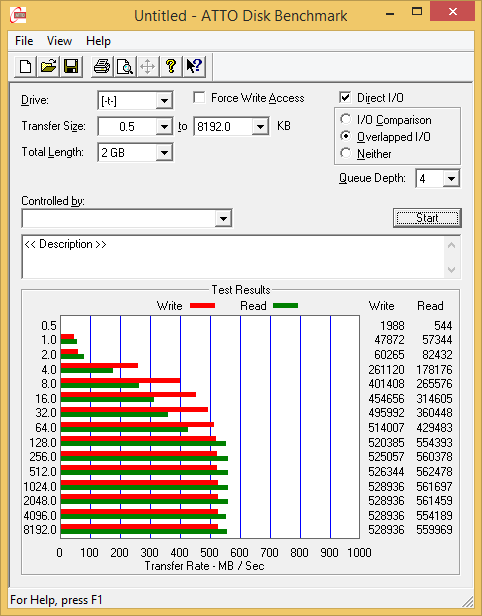 |
|||||||||
Both MK8115 drives have horrible performance on 512-byte transfers, far lower than anything else we've tested in recent memory. Reads are more than 100 times slower for 512B than 1kB transfers, and for writes the difference is a factor of 24. Most filesystems use 4kB or larger block sizes, but 512B accesses are still common enough that this is a fairly severe bug that needs to be dealt with in future firmware.
Beyond 512B transfers, the TLC drive's write speed scales up quicker than the MLC drive, but its read speeds struggle a bit. For 128kB and larger transfers, both drives are operating at full speed and performing similarly to each other and most SATA drives.
AS-SSD
AS-SSD is another quick and free benchmark tool. It uses incompressible data for all of its tests, making it an easy way to keep an eye on which drives are relying on transparent data compression. The short duration of the test makes it a decent indicator of peak drive performance.
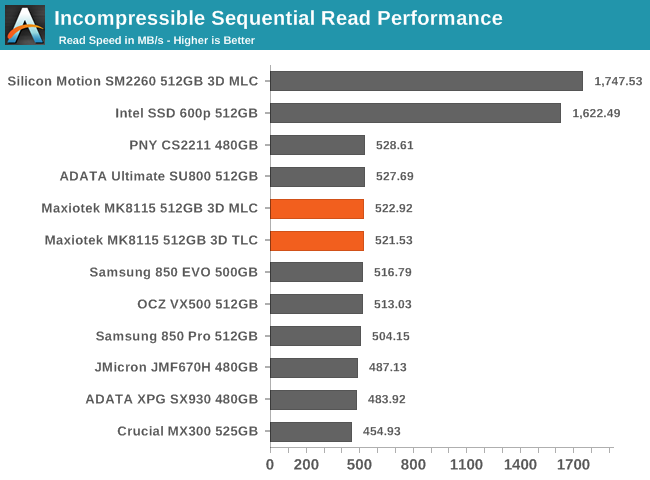
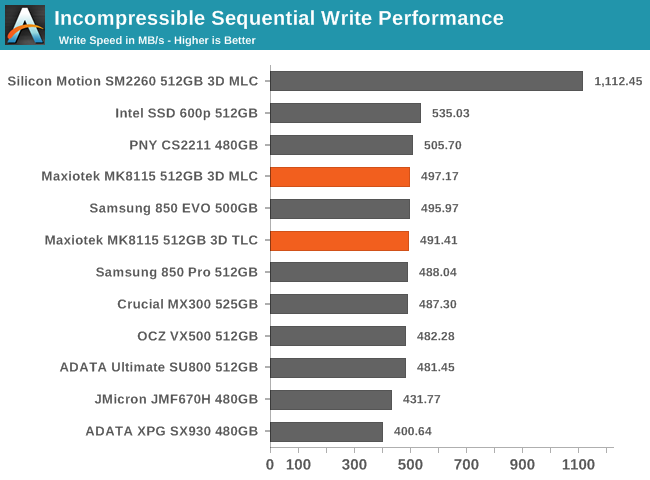
The MK8115 controller does make use of some compression, but its peak sequential read and writes speeds are not reliant upon the data being compressible. The MK8115 drives give AS-SSD performance that is typical for drives that are large enough to saturate the SATA link.
Idle Power Consumption
Since the ATSB tests based on real-world usage cut idle times short to 25ms, their power consumption scores paint an inaccurate picture of the relative suitability of drives for mobile use. During real-world client use, a solid state drive will spend far more time idle than actively processing commands. Our testbed doesn't support the deepest DevSlp power saving mode that SATA drives can implement, but we can measure the power usage in the intermediate slumber state where both the host and device ends of the SATA link enter a low-power state and the drive is free to engage its internal power savings measures.
We also report the drive's idle power consumption while the SATA link is active and not in any power saving state. Drives are required to be able to wake from the slumber state in under 10 milliseconds, but that still leaves plenty of room for them to add latency to a burst of I/O. Because of this, many desktops default to either not using SATA Aggressive Link Power Management (ALPM) at all or to only enable it partially without making use of the device-initiated power management (DIPM) capability. Additionally, SATA Hot-Swap is incompatible with the use of DIPM, so our SSD testbed usually has DIPM turned off during performance testing.
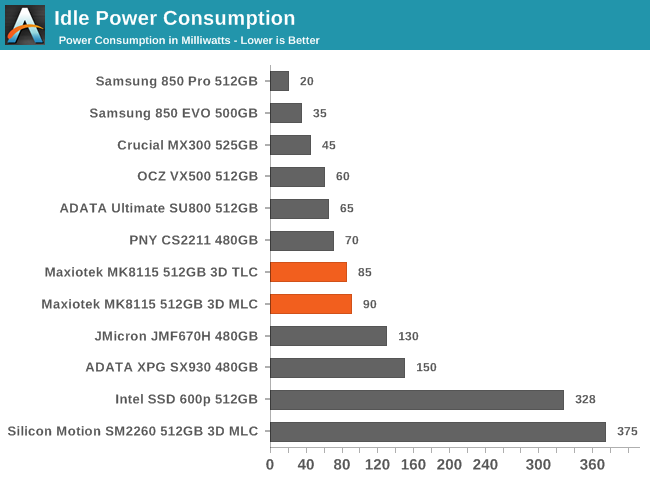
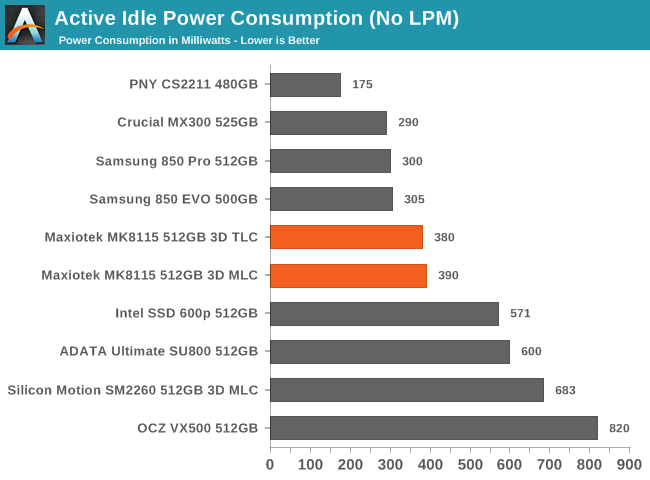
Idle power of the MK8115 is significantly improved over the JMF670H, but still lagging slightly behind the Phison-based PNY CS2211 and nowhere near the best SATA SSDs. Samsung and Marvell use more advanced lithography nodes for their controllers, and the smaller competitors on lagging fabrication processes can't beat them.
The active idle power consumption of the MK8115 drives is decent: it's clearly better than for the Silicon Motion drives or the OCZ VX500, but not quite as good as the Samsung and Marvell drives, nor the unusually efficient PNY CS2211.










60 Comments
View All Comments
jardows2 - Tuesday, May 9, 2017 - link
I fondly remember when new developments in SSD products resulted in lower prices AND better performance. Now it seems that every new product is geared only for lower prices, and the performance is getting worse! Not to mention that the prices have gone up substantially in the past year, I don't think we are at the best value time for SSD's.MajGenRelativity - Tuesday, May 9, 2017 - link
Can you provide evidence of performance getting worse? I haven't seen groundbreaking performance strides in anything but high-end/upper-mid (Samsung 960 series), but I haven't seen a performance regression.Sonic01 - Tuesday, May 9, 2017 - link
i actually found this today, i was looking for a new budget 1tb SSD.my current is a crucial m500 from 2013 i bagged for about £450, now the cheapest 1tb ss'd are about £300 but overall performance is about 30% of the m500..... in 4 years they have dropped 30% of the cost at the expense of 60% of the speed...
MajGenRelativity - Tuesday, May 9, 2017 - link
I looked on amazon.co.uk and the Samsung 850 Evo is 300 for 1TB. I also paged around in Anandtech reviews, and it has better performance than the M500, sometimes significantly so. The MX300 is 250 for 1TB, and it also scores very well on reviews, although I didn't do a very thorough comparison to the M500, it seems a little lower in performance compared to the 850Evo, which should still put it slightly ahead of the M500AlphaBlaster - Sunday, May 14, 2017 - link
That embecil Comey wanted to grab and be in the headlines, and he was manipulating evidence, etc ,and non-evidence, etc.to accomplish that. That's just one thing. He has no integrity. He showed himself to be just another Washington stooge. Hoover was also another Washington stooge and a degenerate, but was fired by the president that committed the crime that he fired Hoover for. If some entity could lob a couple of nukes onto Washington DC when whatever worthless miscreant president at the time is addressing both houses of congress, it would be a blessing!CheapSushi - Wednesday, May 10, 2017 - link
The big difference is the Crucial M500 is MLC NAND and the Samsung 850 EVO and similar cheaper ones are TLC NAND. TLC is inherently slower than MLC; always. It's 2 bits per cell vs 3 bits per cell. It's an important distinction when comparing SLC, MLC, TLC and soon QLC. Maybe you didn't know?extide - Wednesday, May 10, 2017 - link
Yeah, but the 850 is also using #d TLC, not planar TLC, and 3D TLC is a lot faster than planar TLC. Maybe you didn't know?extide - Wednesday, May 10, 2017 - link
#d is supposed to be 3D, of courselowlymarine - Wednesday, May 10, 2017 - link
If only the very site you were on had some sort of database of benchmarks you could check to see that, in fact, the 850 EVO is massively faster than the M500. Oh hey, look what I found! http://www.anandtech.com/bench/product/805?vs=1398MajGenRelativity - Thursday, May 11, 2017 - link
The 850 Evo is faster though, so I'm not sure what you're trying to say